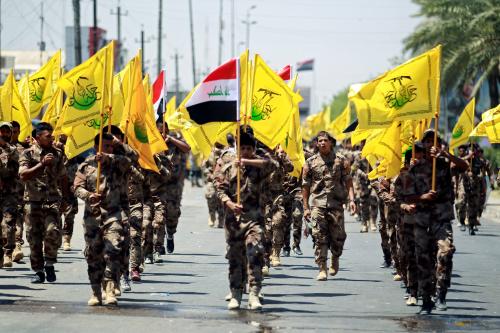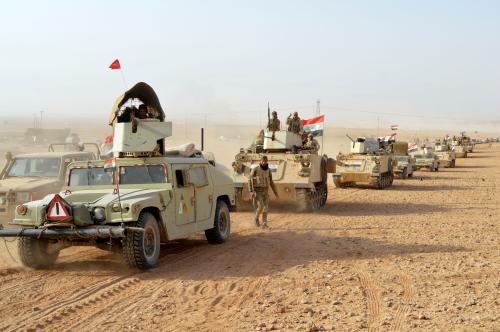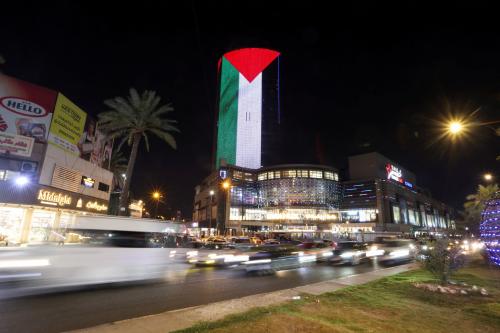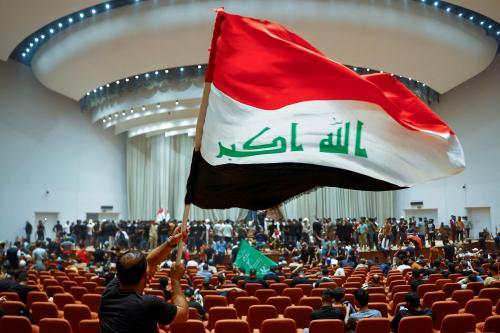Content from the Brookings Doha Center is now archived. In September 2021, after 14 years of impactful partnership, Brookings and the Brookings Doha Center announced that they were ending their affiliation. The Brookings Doha Center is now the Middle East Council on Global Affairs, a separate public policy institution based in Qatar.
In some quarters, Iraq’s Prime Minister Haider al-Abadi has been billed as Washington’s man in Baghdad: an Iraqi nationalist who can reconcile Iraq’s ethnic and religious communities after victories against ISIS; a prime minister that the United States can work with to counter Iran’s influence in the country; a leader who represents a welcome change from the authoritarianism and sectarianism of controversial former prime minister, Nouri al-Maliki.
Al-Abadi, a senior member of Iraq’s ruling Shiite political class and the ruling Islamic Dawa Party, also looked like he might be able to remedy relations with the Arab world after a series of overtures to key U.S. allies in the Gulf, who are concerned by Iran’s dominance in Iraq. Such was Washington’s belief in al-Abadi that the United States even acquiesced to his controversial military offensive into Kirkuk against the Kurds in October 2017, which involved a combination of Iraqi security forces and Iran-aligned militia groups. It came at great cost for U.S.-Kurdish ties (the idea being that a strong, nationalist al-Abadi could appeal to the electorate and sideline Iran’s proxies).
But such beliefs were met with a new reality on Monday, as were (unrealistic) hopes that al-Abadi could rebuild Iraq and bring the country together: His coalition announced that he will join forces with Iran-aligned militias that spear the Popular Mobilization Forces (PMF), the umbrella Shiite militia organization established in 2014 to fill the vacuum that was left by the collapse of Iraq’s armed forces when ISIS seized Mosul.
Just a day later, the Iran-aligned militias—contesting the elections as the al-Fatih (Conquest) bloc—withdrew from the electoral alliance, not out of principle but because of differences over participation and electoral strategy (there were not enough seats to go around). Indeed, Hadi al-Ameri, the head of the Badr Brigade—Iraq’s most powerful militia, which Iran established in the 1980s and which controls the Interior Ministry—has even hinted they could join forces after the elections to form a government.
 While al-Abadi and the Iran-aligned militias of the PMF may not contest the elections as one, a lesson remains: Washington is quickly losing reliable friends and allies in a country where it has invested too much blood and treasure for it not to heed the lessons of the past.
While al-Abadi and the Iran-aligned militias of the PMF may not contest the elections as one, a lesson remains: Washington is quickly losing reliable friends and allies in a country where it has invested too much blood and treasure for it not to heed the lessons of the past.
The Iranian proxies that al-Abadi looked to partner with (and may still partner with after the elections to form a government) are no friends of America’s. At least three of these groups constitute direct Iranian proxies established after 2003 from the ruins of the turmoil and sectarian civil war that followed the fall of the Baath regime. The groups—Asaib ahl al-Haq, Ketaib Hezbollah, and Harakat al-Nujaba—have been complicit in sectarian attacks and other human rights abuses, and their fighters have attacked American and Iraqi civilians and personnel alike. Additionally, these groups have fought in Syria alongside the Bashar al-Assad regime.
The PMF, which is dominated by these groups and the Badr Brigade, has widespread popular support in Iraq. Millions of Iraqi Shiites have credited it with driving out ISIS, and its popularity will almost certainly translate into political gains at the coming elections.
By partnering and working with these forces, al-Abadi will almost certainly secure another term in office. But at what cost? Rag-tag militia groups established by Iran after 2003 to exploit chaos and disorder have made a remarkable transition in recent years, evolving into powerful armed groups that have significant overlap and interactions with the state and society. Asaib ahl al-Haq, infamously known for infiltrating a U.S. military outpost in Karbala, has even transitioned into a socio-cultural movement with offices throughout Baghdad and the Shiite south.
As the spear of the PMF (which was institutionalized into the Iraqi state in 2016) they already enjoy substantial financial resources, legitimacy, and political support, while also retaining the capacity to function autonomously and militarily challenge the Iraqi state if need be. Al-Abadi has effectively elevated the status of these groups even further. The Badr Brigade was integrated into the post-2003 political system and took control of the Interior Ministry because it was the former armed wing of a major Shiite Islamist party (the Islamic Supreme Council of Iraq).
While such a transition from militia to statesmen was the exception, more recently established Shiite militia groups are set to follow the same path. This is thanks to their wartime popularity, for one, but also—crucially—by bandwagoning onto longstanding parties and movements such as al-Abadi’s Islamic Dawa Party. The latter could help them shed their tarnished and bloodied reputations. Increased legitimacy for Iran-aligned militias provides them with greater capacity to influence or control state institutions and weaponize the legitimacy of the state and its resources.
Iran-aligned Shiite militias have already established themselves as Iraq’s version of Lebanon’s Hezbollah (also established by Iran in the 1980s); that is, socio-cultural movements that have a military and social welfare wing and that operate independently of the state. While this would be a far reach, political ascendancy and greater integration into the state could eventually allow them to establish their own version of the Iranian Revolutionary Guards Council (IRGC).
Granted, without partnering with the PMF in some capacity, Iran’s proxies could have spoiled al-Abadi’s efforts to secure a second term, and these groups may also have been co-opted by his Shiite rivals. But this reveals a lack of foresight and ingenuity: It was folly of those in the West who believed it was possible to sideline, ignore, or undervalue Iraq’s Arab Sunnis and Kurds, and gamble on the possibility that al-Abadi could single-handedly counter the meteoric rise of the PMF if he retained control of the prime-minister’s office (the most powerful position in the country) and enhanced his nationalistic credentials.
The United States could have invested in bringing al-Abadi closer together with Kurds and Sunnis, along with other Shiite factions that do not wish to see Iraq fall further into Iran’s orbit, and/or even open up the space for al-Abadi to align with powerful Shiite cleric Muqtada al-Sadr. Alternatively, Washington should have built on what it already had in the bag: a strong Kurdish and Arab Sunni hand in Baghdad. That was weakened when the United States acquiesced to al-Abadi’s offensive into Kirkuk last October, a move that allowed Iran’s proxies fill the resulting vacuum in the oil-rich area and other disputed territories and enhance their influence even further.
Washington is now paying the price for that and will further rue its miscalculations in the coming period. Al-Abadi came into office without a significant political and popular base and it is now clear that he still fears such shortcomings. But by going for the easy option instead of building difficult, pluralistic alliances that could have turned a new chapter in Iraq’s political history, he has undermined hopes for an inclusive, post-ISIS Iraq as well as some of the investments that the United States and its allies have made in both him and Iraq over the past three years.





![A man reads a booklet about the Iraqi draft constitution in the holy city of Najaf October 9, 2005. [Iraq will impose special security measures including travel restrictions and a gun ban for several days on either side of an October 15] referendum on the new constitution, the government said on Saturday. - PBEAHUNWKED](https://www.brookings.edu/wp-content/uploads/2017/11/iraq_constitution001.jpg?quality=75&w=500)




Commentary
Can the US still rely on Iraqi Prime Minister Haider al-Abadi?
January 19, 2018